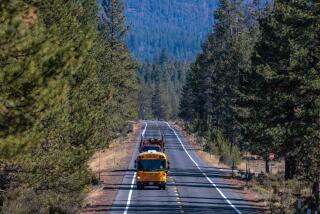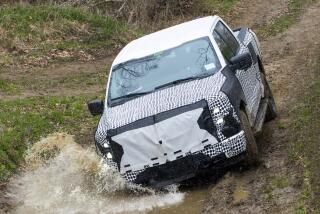Proterra claims world record, says its electric bus traveled more than 1,100 miles on a single charge
Reporting from San Francisco â Proterra, the electric bus company based in Burlingame, Calif., with an assembly plant in City of Industry, claimed a world record for electric vehicle range on Tuesday.
Its Catalyst E2 all-electric bus traveled 1,101.2 miles over a test track on a single charge, the company said.
That bests a range record set in Germany six years ago, when a vehicle called the Schluckspecht-E logged 1,013.76 miles.
The Schluckspecht-E, however, was an aerodynamic lightweight single-seat car, not a 40-foot brick-shaped mass transit bus.
The test was part publicity stunt and part demonstration of the gains made in electric vehicle technology. The longest range Tesla Model S, for example, is rated at 335 miles between charges.
No one has ordered the test bus, laden with battery packs totaling 660 kilowatt hours of energy. The top-end Tesla battery pack is 100 kilowatt hours.
Those comparisons demonstrate the scale of the Proterra project. No one would be choosing between the two, of course.
But Tesla plans to introduce an electric semi-truck tractor concept vehicle in October. Other truck and bus companies have introduced or are planning to introduce all-electric heavy-duty vehicles. One is the Chinese company BYD, which operates a bus and truck assembly plant in Lancaster.
Navistar International, one of the worldâs major truck and bus manufacturers, verified the Proterra range test, which was conducted on Navistarâs test track in New Carlisle, Ind.
The Catalyst E2 is Proterraâs top-end bus. The model currently being sold has an upper range of 350 miles. But battery prices continue to fall as new research is applied to volume manufacturing, and Proterra execs say buses and trucks with ranges topping 1,000 miles will be commonplace within several years.
Ryan Popple, Proterraâs chief executive, said the test vehicleâs 1,101.2 miles tops the range of a diesel-driven bus. âWeâre entering an era where electric vehicles are simply better than internal combustion engines on range.â
Of course, itâs a lot quicker to fill up a diesel engine than to recharge a big battery. And Popple has yet to prove that the test results are transferable to real life.
A Proterra spokeswoman said they wonât reveal the test bus speed, except that its runs around the track were âslow and steady.â
Proterra said the bus used the same LG Chem battery cells used in the buses itâs selling today. LG Chem has worked closely with Proterra to develop battery cell chemistries optimized for heavy-duty vehicles.
Twitter: @russ1mitchell






